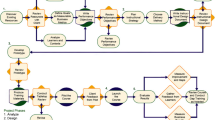Abstract
Previous research into student learning in departments of higher education has shown that links can be established between students' approaches to studying and their perceptions of the academic environment. It has also been found that students with differing study orientations are likely to define effective teaching in ways which reflect those orientations. The study reported here began by identifying different types of student epistemology and then investigated those factors within the academic environment which appeared to influence their incidence. Employing a naturalistic methodology-observations, interviews and case studies - the study was conducted in four departments in one institution of higher education: two arts and two science. Through a process of progressively focusing upon emergent issues, the study evolved through three stages, culminating in a model of the factors appearing to influence the development of student epistemology. It is found that the development of student epistemology is influenced by the interrelated factors of student learning approach, perception of the academic environment and lecturers' theories of teaching, which tends to uphold previous findings. It is also found, however, that students' conceptions of knowledge and their learning approaches are influenced by the ways in which knowledge is structured and presented within departments. Most particularly, a relationship was found between historical and philosophical studies, the methods of teaching them, and the development of student epistemologies.
Similar content being viewed by others
References
Barrett, ‘Differentiation: some aspects of its manifestation, measurement and educational implications’. Unpublished dissertation, Leeds University, Institute of Education.
Becker, H. S. et al. (1968). Making the Grade: The Academic Side of College Life. New York: Wiley.
Bowden, J. A. (1988). ‘Achieving change in teaching practices’, in Ramsden, P. (ed.), Improving Learning: New Perspectives. London: Kogan Page, pp. 255–267.
Broudy, H. S. (1981). ‘Truth and credibility: the citizen's dilemma’, Journal of Aesthetic Education 17(1), (editorial).
Entwistle, N. J. (1987). ‘A model of the teaching-learning process’, in Richardson, J. T. E., Eysenck, M. W., and Warren Piper, D. (eds.), Student Learning: Research in Education and Cognitive Psychology. London: S.R.H.E./Open University Press, pp. 13–28.
Entwistle, N. J., and Ramsden, P. (1983). Understanding Student Learning. London: Croom Helm.
Entwistle, N. J., and Tait, H. (1990). ‘Approaches to learning, evaluations of teaching, and preferences for contrasting academic environments’, Higher Education 19, 169–194.
Entwistle, N. J., Hanley, M., and Hounsell, D. (1979). ‘Identifying distinctive approaches to studying’, Higher Education 8, 365–380.
Fox, D. (1983). ‘Personal theories of teaching’, Studies in Higher Education 8 (2), 151–163.
Gagné, R. M. (1965). The Conditons of Learning. New York: Holt, Rinehart & Winston.
Kelly, G. (1955). The Psychology of Personal Constructs, Vols. I & II. New York: Norton.
Laurillard, D. (1979). ‘The process of student learning’, Higher Education 8, 395–409.
Marsh, H. W. (1987). ‘Students' evaluations of university teaching research findings, methodological issues, and directions for future research’, International Journal of Educational Research 11 (3).
Marton, F. (1981). ‘Phenomenography - describing conceptions of the world around us’, Instructional Science 10, 177–200.
Marton, F. et al. (1984). The Experience of Learning. Edinburgh: Scottish Academic Press.
Marton, F. and Säljö, R. (1976). ‘On qualitative differences in learning: I - Outcome and process’, British Journal of Educational Psychology 46, 4–11.
Miller, C. M. L., and Parlett, M. (1974). Up to the Mark: A Study of the Examination Game. London: S.R.H.E.
Osborne, R., and Gilbert, J. (eds.) (1985). Some Issues of Theory in Science Education. Science Education Research Unit, University of Waikato, Hamilton, New Zealand.
Pask, G. (1976). ‘Styles and strategies of learning’, British Journal of Educational Psychology 46, 128–148.
Perry, W. G. (1970). Forms of Intellectual and Ethical Development in the College Years: A Scheme. New York: Holt, Rinehart & Winston.
Pope, M. L., and Gilbert, J. K. (1985). ‘Theories of learning: Kelly’, in Osborne, R. and Gilbert, J. K. (eds.), Some Issues of Theory in Science Education. Science Education Research Unit, University of Waikato, Hamilton, New Zealand.
Pope, M. L., Watts, D. M., and Gilbert, J. K. (1983). ‘Alternative frameworks: representations of schoolchildren's understanding of science’. Presented at First International Symposium on Representing Understanding, Guy's Hospital, London, February 1983.
Ramsden, P. (1979). ‘Student learning and perceptions of the academic environment’, Higher Education 8, 411–428.
Ramsden, P. (ed.) (1988). Improving Learning: New Perspectives. London: Kogan Page.
Ramsden, P., and Entwistle, N. J. (1981). ‘Effects of academic departments on students' approaches to studying’, British Journal of Educational Psychology 51, 368–383.
Svensson, L., and Högfors, C. (1988). ‘Conceptions as the content of teaching: improving education in mechanics’, in P. Ramsden (ed.), Improving Learning: New Perspectives. London: Kogan Page, pp. 162–177.
Author information
Authors and Affiliations
Rights and permissions
About this article
Cite this article
Sheppard, C., Gilbert, J. Course design, teaching method and student epistemology. High Educ 22, 229–249 (1991). https://doi.org/10.1007/BF00132289
Issue Date:
DOI: https://doi.org/10.1007/BF00132289




